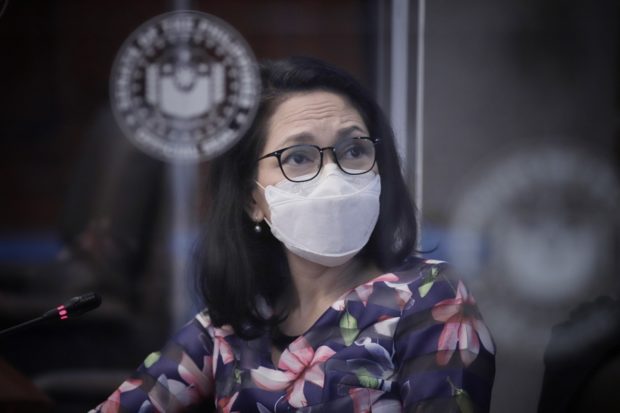P40B kickback through ‘pastillas’ scheme, VUA issuances bared

‘PASTILLAS’ SCAM: Senator Risa Hontiveros, presiding over the hybrid hearing of the Committee on Women, Children, Family Relations and Gender Equality Tuesday, October 20, 2020, says the investigation on the “pastillas scam” in the Bureau of Immigration is getting a big picture. “We will get to the bottom of this. This house of cards will fall. It’s not a matter of if, but when. We will break their business model,” Hontiveros said. (Joseph Vidal/Senate PRIB)
MANILA, Philippines — Senator Risa Hontiveros on Tuesday bared that the “masterminds” of a “corrupt business model” at the immigration bureau have allegedly pocketed over P40-billion in kickbacks since 2017 from facilitating the entry of Chinese nationals through the so-called Visa Upon Arrival (VUA) scheme and the “pastillas” scam.
“Kung tutuusin, maaring P30 billion hanggang P40 billion pataas ang kinita nitong pinagsamang VUA and ‘pastillas’ na nagsimula nung binuksan natin ang ating borders sa China,” Hontiveros said during the Senate hearing on the so-called “pastillas” racket which facilitates the seamless entry of Chinese nationals for a fee.
“May nangungurakot sa bawat sulok ng Bureau of Immigration (BI). Sa ‘pastillas’ scam, ang estimate natin ay natabo ng mga mastermind na nito ay P30 billion, that’s based on the arrival data of Chinese nationals na non-VUA. Sa VUA naman, another revenue stream, the kickbacks go straight into the pockets of some officials,” she added.
Hontiveros said she estimates alleged kickbacks from VUA issuances at P11 billion to P15 billion.
According to the whistleblowers who surfaced during the hearings, masterminds of the scam take part of the bribe money.
Article continues after this advertisement“Sa Pastillas, ang pera pumapasok sa airport, tapos sa mga IO (immigration officer) pinapamigay. Bago siya mag resign, si Red Mariñas ang in charge bilang chief ng Ports Operations Division (POD),” Hontiveros said.
Article continues after this advertisementMariñas was tagged as the alleged “ringleader” of the so-called “pastillas” group. He has since denied allegations against him.
For the VUA transaction, Hontiveros said the purported bribe allegedly goes straight to the main office, where the visas are approved.
The VUA program is a landed visa scheme that the government launched three years ago to attract more Chinese tourists into the country.
Under the scheme, a VUA grantee is allowed to enter and stay in the country for 30 days without the need to obtain an entry visa from a Philippine consulate in his port of origin.
The senator noted that in previous hearings, it was established that VUAs were processed by travel agencies, many of whom only required a mere screenshot of the applicant’s passport sent via WeChat.
“The person involved could have been trafficked by a syndicate, but as long as she or he had no derogatory record on paper, then that person would have been able to enter the country with a VUA,” Hontiveros’ statement read.
Citing data from the BI, the senator said around four million Chinese nationals have entered the country since 2017.
Around 3.8 million of these four million Chinese nationals were non-VUA applicants while over 150,000 were VUA applicants, according to Hontiveros.
She said the non-VUA applicants are believed to have paid the P10,000 service fee through the “pastillas” scam.